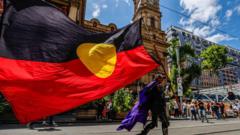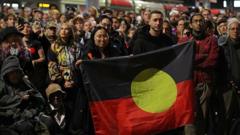In the lead-up to the national election, lack of attention to Indigenous issues has left many, like Suzanne Andrews from Yarrabah, feeling disenfranchised and ignored. After the failed Voice to Parliament referendum, political leaders have shied away from discussing First Nations matters, prompting calls for genuine representation and dialogue.
Silence in the Campaign: Indigenous Voices Neglected Again

Silence in the Campaign: Indigenous Voices Neglected Again
As Australia heads to the polls, the silence surrounding Indigenous issues raises concerns about political engagement and representation.
With just days until the national election in Australia, the streets of Yarrabah, a small Indigenous community in Far North Queensland, remain eerily quiet, devoid of the usual campaign fervor seen in other regions. Leaders and candidates' posters are absent, and the only disruption to the tranquillity comes from an ice cream truck navigating the winding roads, a stark contrast to the silence surrounding political discussions about Indigenous issues.
Suzanne Andrews, chief executive of Gurriny Yealamucka Health Services in Yarrabah, voiced her disappointment at the lack of engagement from political leaders. As she sat watching the leaders' debate on television, she was struck by the absence of any conversation surrounding Aboriginal concerns. "What the hell's going on?" she questioned.
Indigenous Australians, who comprise about 3.8% of Australia's 26 million citizens, consistently face the most adverse socio-economic conditions, a situation labeled as a "national shame." However, the current electoral campaign has seen little discourse from Prime Minister Anthony Albanese or Opposition leader Peter Dutton regarding First Nations issues. Dutton's recent remarks on "overdone" Indigenous ceremonies are an exception, yet they do not address the significant disadvantages faced by Aboriginal peoples and are perceived as dismissive.
The aftermath of the 2023 Voice to Parliament referendum, which aimed to recognize Aboriginal and Torres Strait Islander rights in the Australian Constitution, has left its mark on the political landscape. After 60% of voters rejected the proposal, many believe the rhetoric around First Nations policies has quieted down as politicians avoid polarizing topics. Experts assert that this cautious approach may stem from fear of electoral backlash, exacerbated by the referendum's contentious nature and resistance to creating perceived "special classes" among citizens.
Ms. Andrews reflects on her disappointment with the political landscape that has emerged since the referendum. The lack of focus on Indigenous issues has led many politicians to prioritize safer, less controversial campaigns. Prominent anti-Voice campaigner Warren Mundine emphasized the need to continue advocating for Indigenous rights, regardless of the referendum outcome. He lamented that discussions surrounding Aboriginal policies have dissipated in this election, highlighting a troubling trend of disengagement from essential Indigenous matters.
Independent senator Lidia Thorpe criticized leaders for their reluctance to acknowledge Indigenous issues, attributing it to fear following the referendum's failure. She urged both parties to seize the opportunity to address ongoing injustices and improve dialogue concerning First Nations peoples’ rights. The Closing the Gap strategy, initiated in 2008 to address disparities affecting Indigenous communities, has shown insufficient progress, with reports indicating that only four out of 18 key measures are on track.
Scholars argue that, despite years of increased focus on Indigenous issues, this election marks a return to a norm where such topics are sidelined. Voter attitudes regarding the importance of addressing Indigenous living standards have also waned, with recent research suggesting diminishing public support for government action.
Politicians like Bob Katter acknowledge the need for more self-governance for Indigenous Australians but struggle with effectively raising these topics during campaigns, fearing voter repercussions. Following the referendum, a surge of racial hostility toward First Nations peoples has led to heightened anxiety among Indigenous communities, particularly affecting younger generations.
The contentious political environment leading up to the referendum resulted in increased societal tensions, leaving many Indigenous Australians disillusioned with the political process. As they withdraw from political engagement, the silence surrounding necessary discussions on Indigenous rights underscores the urgent need for genuine representation and commitment from political leaders to prioritize First Nations issues in the future.
Suzanne Andrews, chief executive of Gurriny Yealamucka Health Services in Yarrabah, voiced her disappointment at the lack of engagement from political leaders. As she sat watching the leaders' debate on television, she was struck by the absence of any conversation surrounding Aboriginal concerns. "What the hell's going on?" she questioned.
Indigenous Australians, who comprise about 3.8% of Australia's 26 million citizens, consistently face the most adverse socio-economic conditions, a situation labeled as a "national shame." However, the current electoral campaign has seen little discourse from Prime Minister Anthony Albanese or Opposition leader Peter Dutton regarding First Nations issues. Dutton's recent remarks on "overdone" Indigenous ceremonies are an exception, yet they do not address the significant disadvantages faced by Aboriginal peoples and are perceived as dismissive.
The aftermath of the 2023 Voice to Parliament referendum, which aimed to recognize Aboriginal and Torres Strait Islander rights in the Australian Constitution, has left its mark on the political landscape. After 60% of voters rejected the proposal, many believe the rhetoric around First Nations policies has quieted down as politicians avoid polarizing topics. Experts assert that this cautious approach may stem from fear of electoral backlash, exacerbated by the referendum's contentious nature and resistance to creating perceived "special classes" among citizens.
Ms. Andrews reflects on her disappointment with the political landscape that has emerged since the referendum. The lack of focus on Indigenous issues has led many politicians to prioritize safer, less controversial campaigns. Prominent anti-Voice campaigner Warren Mundine emphasized the need to continue advocating for Indigenous rights, regardless of the referendum outcome. He lamented that discussions surrounding Aboriginal policies have dissipated in this election, highlighting a troubling trend of disengagement from essential Indigenous matters.
Independent senator Lidia Thorpe criticized leaders for their reluctance to acknowledge Indigenous issues, attributing it to fear following the referendum's failure. She urged both parties to seize the opportunity to address ongoing injustices and improve dialogue concerning First Nations peoples’ rights. The Closing the Gap strategy, initiated in 2008 to address disparities affecting Indigenous communities, has shown insufficient progress, with reports indicating that only four out of 18 key measures are on track.
Scholars argue that, despite years of increased focus on Indigenous issues, this election marks a return to a norm where such topics are sidelined. Voter attitudes regarding the importance of addressing Indigenous living standards have also waned, with recent research suggesting diminishing public support for government action.
Politicians like Bob Katter acknowledge the need for more self-governance for Indigenous Australians but struggle with effectively raising these topics during campaigns, fearing voter repercussions. Following the referendum, a surge of racial hostility toward First Nations peoples has led to heightened anxiety among Indigenous communities, particularly affecting younger generations.
The contentious political environment leading up to the referendum resulted in increased societal tensions, leaving many Indigenous Australians disillusioned with the political process. As they withdraw from political engagement, the silence surrounding necessary discussions on Indigenous rights underscores the urgent need for genuine representation and commitment from political leaders to prioritize First Nations issues in the future.




















